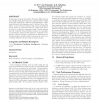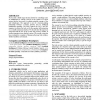619 search results - page 10 / 124 » A logical formalism for the subjective approach in a multi-a... |
KBSE
2005
IEEE
14 years 9 days ago
2005
IEEE
Traits are basically mixins or interfaces but with method bodies. In languages that support traits, classes are composed out of traits. There are two main advantages with traits. ...
ATAL
2008
Springer
13 years 8 months ago
2008
Springer
Recognizing team actions in the behavior of embodied agents has many practical applications and had seen significant progress in recent years. One approach with proven results is ...
GECCO
2008
Springer
13 years 7 months ago
2008
Springer
In this paper we apply three Neuro-Evolution (NE) methods as controller design approaches in a collective behavior task. These NE methods are Enforced Sub-Populations, MultiAgent ...
ATAL
2005
Springer
14 years 8 days ago
2005
Springer
We describe a Multi-Agent System (MAS) for controlling teams of uninhabited air vehicles (UAVs) in the context of a larger system that has been used to evaluate potential concepts...
SACMAT
2009
ACM
14 years 1 months ago
2009
ACM
An access control system is often viewed as a state transition system. Given a set of access control policies, a general safety requirement in such a system is to determine whethe...


